At self-sufficient dairy farms, 'the pandemic hit, and people started coming'
Food. Farmers who pasteurize their milk on-site or sell raw milk are having their best spring ever.
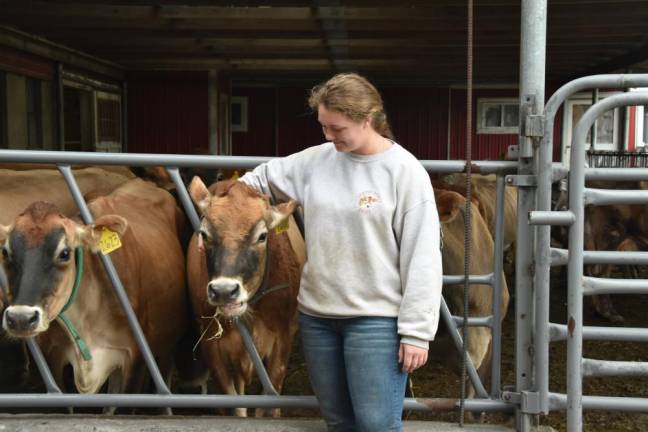
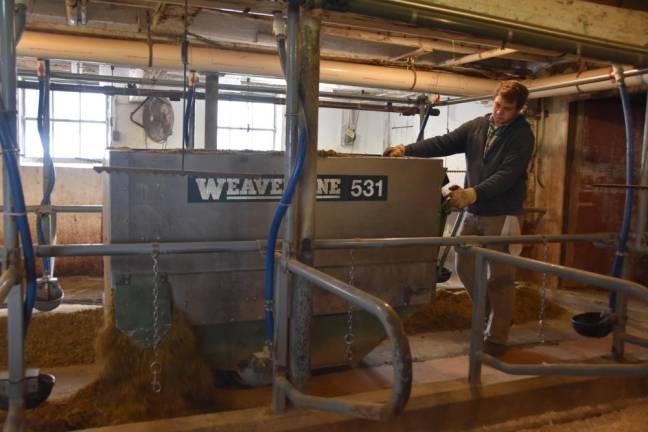
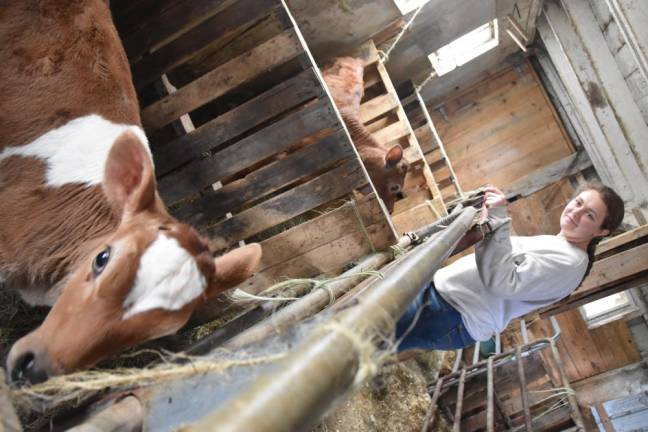
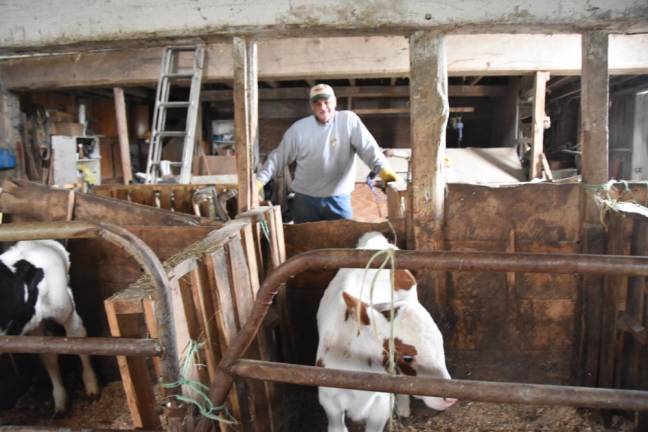
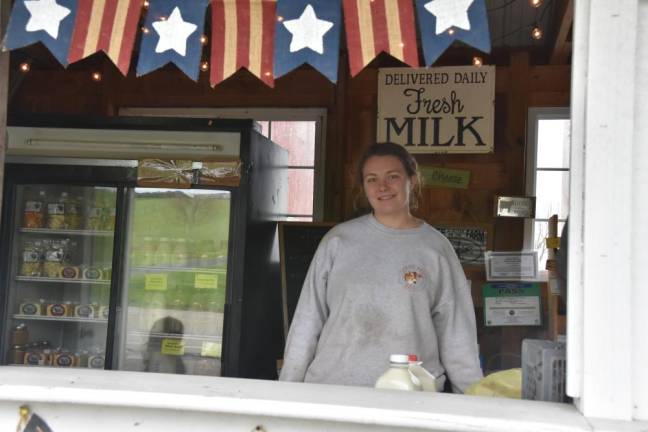
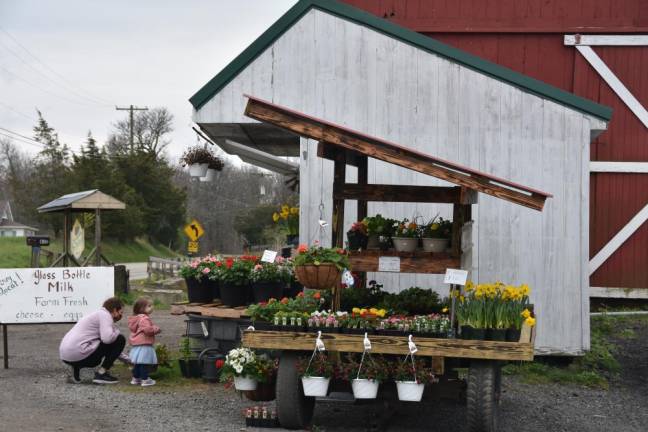
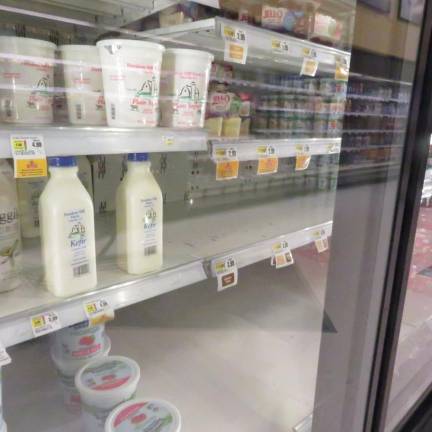
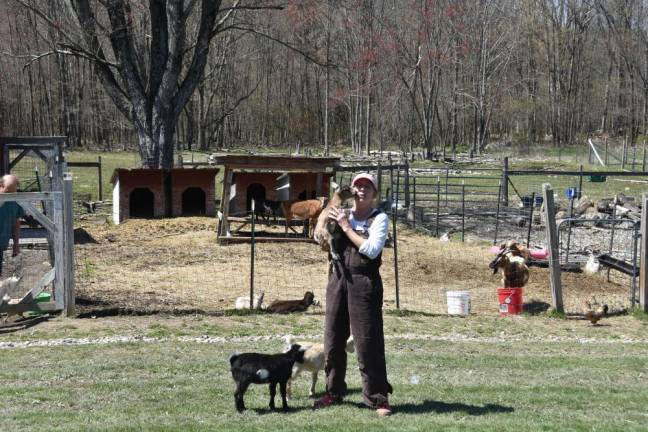
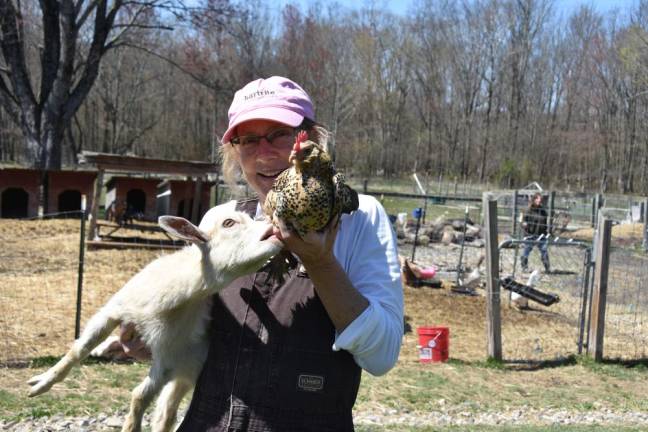
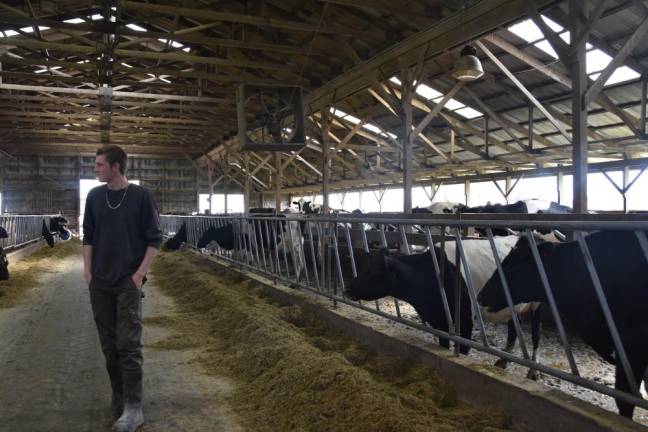
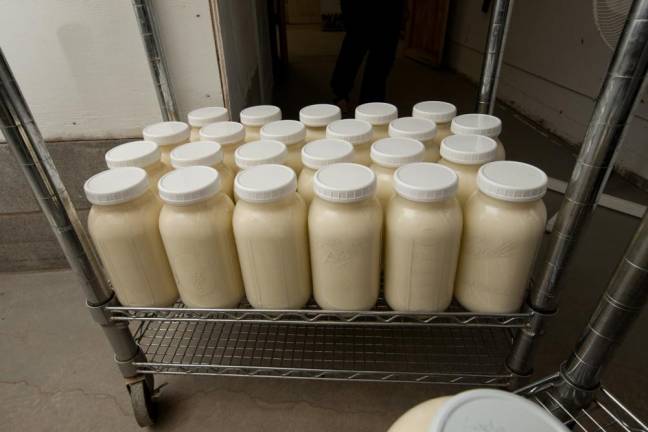
As shoppers face gap-toothed shelves at the grocery store, farms everywhere are feeling the pain from the other end of an upended food supply chain. Even here, in New York City’s foodshed, for a cruel two weeks, iconic dairy farms had to dump truckloads of milk – or spread it on fields as a very expensive fertilizer – when their processor pressed pause. The dumping has stopped now, but the price most farmers are getting for their milk continues to plummet. Such is the downside of a sleek supply chain that, when times are good, is a model of efficiency.
But for the handful of dairy farms in the region that bottle their own milk, the story couldn’t be more different. Farmers who have the infrastructure to pasteurize their milk on-site, or who have a license to sell raw milk, or both, are having their best spring ever.
Freedom Hill Farm
“For me, anyway, there’s almost a sense of guilt,” said Chris Vreeland, of Freedom Hill Farm in Otisville, N.Y. “I don’t want to benefit off of the hardship of others. But we’re seeing success in our business as all this takes place. We’re fortunate to have the animals we have and the milk that we produce, to be able to get it out there.”
Freedom Hill Farm was started by Chris’ parents, Rick and Julie Vreeland, who still get up at 3:30 a.m. daily to milk 47 head of cattle. They sell raw milk and pasteurize the rest on-site, to make yogurt and kefir.
Before starting Freedom Hill in 2007, Rick operated a conventional dairy upstate with 2,000 cows. “I got out of that business because you’re always dependent on someone else," Rick said. "They pay you slow, they pay you late, if they pay you. Stress got me out, I’ll say that.”
Selling straight to customers, Rick finally felt in control of his own business. “Small, you can raise a family, get intimate with the animals,” he said. But would it pay the bills? Year after year, that remained an open question.
Chris came onboard four years ago to apply his entrepreneurial expertise to the supply side. He handles what Rick calls “the stress work: the phone calls, the ordering, the finagling. I’m just in charge of making milk and taking care of the cows.” Thanks to Chris, Freedom Hill yogurt and kefir is now a familiar sight on grocery store shelves from Brooklyn to Schenectady. Still, even with their expanded reach and a new farm market on-site, the farm’s survival was precarious. Rick and Julie did what they’ve always done in this situation. They prayed.
“We started asking Him like last fall,” said Rick, 68. “We know you bless us. Just bless us so we can pay the bills. We were having trouble just paying the bills. Just right up ‘til the pandemic. And then the pandemic hit, and, you know, people started coming.”
Before the pandemic, there’d usually be leftover milk that got fed to the pigs. No more. “We’re using everything that we produce right now,” said Chris. Before, processing milk into yogurt and kefir was an every-other-day activity. “Now it’s max capacity, seven days a week we’re up there processing,” Chris said. As fast as the cultures can ferment, and Chris can get it to grocery stores, it’s getting snatched up.
Store after grocery store, Chris has noticed that dairy aisles are particularly hard hit. “They’re out of all their yogurts,” he said, especially the family sizes. “You might see a ton of single-serve flavored yogurts on the shelf, but you’re not seeing your mainstay two-pound yogurts, the plains, the vanillas, the low fats, the full fats, the no fats. And therefore when I put mine on the shelf it just gets pulled.
“It’s not just paper towels and Lysol that’s missing. It’s a lot of the grocery items. I get scared because at some point, if that continues, it just puts a little bit of fear into society. People start wondering, ‘When can we get this? What am I going to need and can’t get?’”
Rick is more sanguine. He has increased his milking herd by 10 cows since the pandemic, which means the twice-daily milking takes over an hour instead of 45 minutes. That’s fine by Rick. All he wants to do is milk cows anyway. “It’s still wonderful,” he said. “A lot of people tell me, ‘Why don’t you retire?’ I am retired, I love this.”
Does he worry about getting the virus, with all the people beating a path to the farm, some all the way from New York City? “I don’t, and I won’t,” Rick said. “I’m not callous about it, but if I die, that’s when I’ll rest.”
GilLikays Goat Milk
Down the road, Lisa Gromacki of GilLikays Goat Milk in Middletown, N.Y., has seen a complete halt of her dog boarding business since the pandemic, and a simultaneous rise in customers interested not only in goat milk and cheese, but also in buying their own goats.
The day I visited, two baby goats whose mothers had rejected them were snoozing in the former doggy run, awaiting one of five or six bottles of the day. “I have a retirement pen. I’m not so good at getting rid of goats,” said Gromacki, who regularly takes special-needs animals into the house. “I’m not a very good farmer.”
Self-deprecation aside, Gromacki has a committed customer base that followed her from Goshen, N.Y., when she moved in 2011. Since the pandemic, new ones have been seeking her out. A family with an infant just bought a pair of goats -- a dam and baby -- so that they can milk the goat if they want, or if they get tired of that, leave the kid with the dam. Another new mom recently bought a gallon of goat milk – along with three goats.
“People want to have their own milk,” said Gromacki. “It could be that they’re scared, not being able to get good food, or clean food, and you know it’s not from China.”
Goat milk is very similar to human milk, she said. Notwithstanding the price tag of $22 a gallon, some parents – notably those from other countries – go to great lengths to seek it out. Over the years, “I’ve raised six babies,” Gromacki said. She’s instituted a discounted new-mom price of $20 a gallon.
Since she resumed milking this spring, Gromacki has been getting about 13 customers to the farm a day to buy milk, cheese, and eggs from her free-range flock. One customer picked up 10 dozen eggs. “Now we have to make more cheese too,” she said, “because it seems like demand went up for that.” If milk doesn’t sell right away, she pasteurizes it and makes cheese.
Now she’s milking 15 goats, and in another month she’ll be milking as many as 30. Gromacki has two employees, as well as nieces who regularly drop in to help – these days, between their Zoom classes. Sometimes she uses the milking machine she bought last year, but cleaning all those tubes takes almost as long as milking by hand. So when a niece pops by, like she did this morning, they’ll just milk the old-fashioned way.
She’s noticed a couple other side effects of the pandemic: the glass half-gallon jars she buys from the hardware store are sold out, so she had to order some online. “Also, with the virus, I have a lot of families that will come and just want to walk around with their kids on a nice day,” she said. “This little farm is a major outing now.”
Springhouse Creamery
“It’s been good, but it’s been a little overwhelming,” said Laina Southway, 21, as she greeted a visitor at Springhouse Creamery in Fredon, N.J. “I think it’s a blessing in disguise.” Laina is the daughter of Peter Southway, owner of Springhouse Creamery. Four of the six Southway siblings work on the farm.
Peter was a banker for 25 years before corporate burnout inspired him to change careers and start a farm in 2003. “I believe I’m the only graduate of Pace that milks cows,” he said. His degree in economics and finance have proved crucial: “I’m a farmer that knows how to do math,” he said.
He started out milking 30 cows, then to add value, began making some cheese to sell at farmers markets. It was a good start. But as his kids expressed interest in joining the family business, it clearly wasn’t enough to support them. He started researching ways to make the farm more profitable, and found "a very interesting niche market in the glass bottled milk industry."
He invested $200,000 in an energy-efficient system to pasteurize and bottle milk on-site – but not before making his kids sign 10-year contracts, he jokes. Their pasteurizer, called Lili-B, is the second of its kind. The first is installed at Vermont Technical College’s 300-acre teaching farm. In February 2018, “We were the first in northern New Jersey to actually put milk in a bottle,” he said.
The retro business of selling milk locally in attractive glass jars had been growing at a steady clip from the get-go, said Peter. Old-timers kept telling him that this was what milk used to taste like. After all, the milk had traveled a grand total of about 50 feet from cow to holding tank to milk room to farmstand fridge.
By the time the pandemic hit, the Southways were only sending a truckload of milk off the farm once a week. That meant they only had to dump one truckload when the supply chain got backed up. “It was on a weekend, and we don’t generally pasteurize on weekends,” said Laina. Well, they didn’t used to pasteurize on weekends, but they do now.
They’ve gone from processing milk twice weekly, to bottling every day but Sunday, often until 9:30 p.m. “We’ve been staying up as late and getting up as early as we have to, so people can have what they need,” said Laina. They've bulked up their farmstand offerings to include pasta, their mom's maple syrup, peach salsa, tomato sauce, flowers, and vegetable seedlings: “Everything we put in the stand, they buy,” said Laina.
To keep up with demand, the Southways bought four more cows from Bellvale Farm in Warwick, N.Y., increasing their milking herd to 56. They ran out of glass jars and had to start selling milk in plastic containers as well – which is also more convenient for customers getting home delivery who can’t return the jars. They are cleaned out of beef, and the slaughterhouse, Lehigh Valley Meats, is booked until the end of May.
As we talk, Neal Southway, 18, a high school senior, moves through the barn pulling a feeder that looks like an oversized airplane drink cart, serving up the mixed rations that the cows will eat when they return.
The Southways are barely keeping up. But they manage to sit down to dinner together every night, and they're making good money. If they’d been trucking all their milk off when the pandemic hit, “You’re out of business,” said Peter. He takes out his phone and finds the latest communication from the Dairy Farmers of America. The price of milk had fallen to 61 cents per half-gallon. Rumor had it, it was still falling. That’s one-sixth of the price that the Southways get on the farm, where customers drop $3.50 into the honor system box for that same half-gallon, often as not rounding up to the nearest dollar.
Stap Dairy
“I’ve got all the time in the world,” says Garrett Stap, 21, greeting a visitor outside the barn where he milks 116 cows. This is a farmer skill: the ability to completely relax in the middle of a workday that starts at quarter to 4 in the morning and ends at 11:30 p.m.
“We take shifts,” said Garrett. “Me, my mother and my father.” Bob Stap does the bottling, Stacey Stap is the processing plant superintendent, and Garrett is “pure cow”: feeding, cleaning, milking, taking care of the calves. They all pitch in for field work, and a cousin who was just laid off is helping out.
The Staps invested in their own pasteurizing system in 2017, in the hope of providing enough security that Garrett, a fourth-generation farmer, could confidently join the family business. Their wake-up call came when they lost their milk market the year before, with the closure of Elmhurst Dairy in Jamaica, Queens, which supplied milk to huge institutions like New York City public schools and Starbucks. “We had to become self-sufficient,” said Garrett.
They tried selling raw milk, but being limited to on-farm sales was a deal breaker in rural Pine Bush, N.Y. “When everyone had to come pick it up – well this ain’t working,” recalls Garrett. So they hired a former New York State inspector as a consultant and took the plunge, shelling out for a 100-gallon vat pasteurizer.
“We went a whole year wondering if we did the right thing,” said Garrett. He graduated from SUNY Cobleskill in 2018, where he majored in agricultural business.
Then came the pandemic, along with eight days of having to dump 2,000-gallon truckloads of milk. “It was just our turn,” said Garrett, of the dumping. He has a hunch it isn’t the last time that kind of breakdown is going to happen, either. “We are lucky enough to have these private sales to fall back on,” he said.
The Staps cranked up their 100-gallon pasteurizer. They went from from running it two or three times a week, to running it twice a day, every day, morning and night. The community, hearing about the dumping, came out to buy milk as fast as the Staps could pasteurize it. It was flying out of the self-serve fridge so fast that at one point, Stacey told Garrett to go distract the customers to slow them down because she couldn’t keep the shelves stocked. Garrett started talking to one guy who turned out to be a police officer who’d driven all the way from Sloatsburg, N.Y., about 50 minutes away.
“I had people asking me about doing home delivery,” said Garrett. “Well, I have no idea how to choreograph that.”
The dumping is over now, and their milk sales have slowed a bit from that fever pitch. But the Staps are still operating in high gear, trying to find their rhythm. Gone are the days when Garrett took orders on a Monday, bottled on Tuesday and Wednesday, and delivered on Friday. Now, “it leaves here so fast, you get it the same day it was in the cow, every day," said Garrett.
These days they’re running the pasteurizer every morning and three nights a week “with the hope we can take a Sunday off,” said Garrett. “Hasn’t happened.” They’re looking into getting a bigger pasteurizer so they can free up time for field work: 300-gallon? 500-gallon? “We don’t really know what we want to do,” he said. All they know is in a couple weeks, they’ll be cutting hay.
“It’s overwhelming sometimes,” Garrett admitted. “We’re just lucky the driveway’s circle-shaped. We can get in and out.”
“There’s almost a sense of guilt. I don’t want to benefit off of the hardship of others. But we’re seeing success in our business as all this takes place." --Chris Vreeland, Freedom Hill Farm